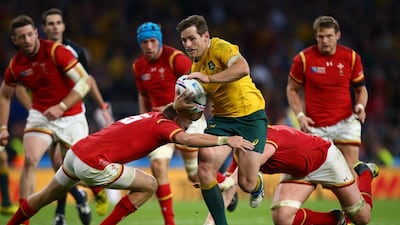TWICKENHAM, England// Some time down the line there may be a film about the 13 Wallaby men who heroically defended for seven minutes to set up their inspiring 15-6 victory over Wales last night.
Australia had lost scrum-half Will Genia and lock Dean Mumm to the sin bin approaching the final quarter. But marshalled indefatigably by captain Stephen Moore, the Wallabies may have buckled, but they did not break.
Wales crossed the line three times during that period through George North, Liam Williams and Toby Faletau, but each time those players were held up by the sheer grit and determination from those 13 Wallaby players.
Lock Kane Douglas, blindside flanker Scott Fardy and No 8 David Pocock repeatedly got back up on their feet from the tackle to make another. While in the scrums, props Scott Sio and Sekope Kepu brought relief throughout the match. And when Adam Ashley-Cooper made the gamble of his 110-cap career by cutting off North in midfield deep in his own half to turnover possession, he not only alleviated the siege but set his side on a course to an 11th successive victory over Wales.
Rugby World Cup finals have all been won with an accent on defence, and Australia have done their prospects of lifting the Webb Ellis Trophy in three weeks no harm at all by adhering to Nathan Grey’s defensive systems.
“It is not a secret weapon,” Wallaby coach Michael Cheika said. “If behind every man is a good woman, behind every good attack is a good defence.
“Defence is one of the most humbling parts of the game because you can get torn apart if you are not concentrating.
ALSO READ:
Saturday: Scotland quell Samoa to make quarter-finals
“We missed too many tackles last week against England.
“We got away with it this time, but you won’t get away with it too many times at this level. I’m very proud of their resilience.”
Australia won through five penalties from fly-half Bernard Foley to a first-half brace from opposite number Dan Biggar, who later missed his first kick of the tournament on the stroke of half time when his side trailed 9-6.
Having topped Pool A, Australia will now face Scotland here next Sunday in the quarter-finals after Vern Cotter’s side squeezed past Samoa 36-33 earlier in the day.
If Wales’s attack struggled to make a breakthrough, Scotland, the Six Nations wooden spoon team, are also likely to – despite their new-found appetite for crossing the whitewash.
Wales crossed the gainline twice as many times as Australia, ran with the ball more, and dominated possession and territory, but it was never enough.
“You have got to give Australia a lot of credit. We were hungry for that try,” Sam Warburton said. “If we spend that amount of time in their half, we have to come away with a try. I think any country would have backed themselves to score.
“We threw absolutely everything at them. I don’t have any regrets, we tried everything.”
Scotland and Samoa had served up a feast of entertainment through seven tries but this was a no less exciting and tense.
Wales dominated the opening 15 minutes and anchored in Australia’s half and kept probing the defensive lines relentlessly.
With Justin Tipuric and Warburton working in tandem, the Welsh back-row managed to turn over Australia numerous times in their own half.
The Wallabies were therefore forced in to tackling everything that moved. In the first 10 minutes, their tackle rate was three times that of the Welsh, one of which was McMahon’s crunching hit on Dan Biggar that stopped the fly-half like he was trying to run into Uluru.
Australia’s attacking threat was largely negated by Wales’s use of the smother tackle, which coach Warren Gatland conceded later was a tactic his side had decided to employ before the match.
In the second half, the game opened up more. But after those punishing seven minutes, Cheika was forced to empty his entire bench. With Moore a constant voice in the ear of referee Craig Joubert, the Wallabies had no problem winding down the clock in a disjointed final 10 minutes.
“The guys just did their job,” Moore said.
“We have talked about the pressure, but it is not complicated. It is just working hard for each other. You don’t magically find that on the weekend.”
sports@thenational.ae
Follow us on Twitter at NatSportUAE

